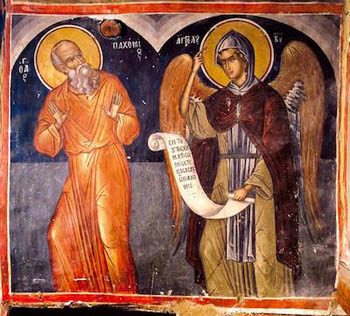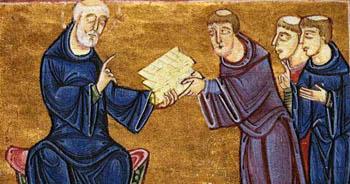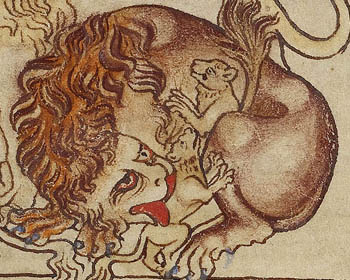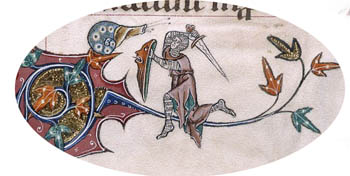Saints of the Day
 |
 |
 |
 |
 |
 |
 |
St. Pachomius the Great - May 9
Biographical selection:
The Syrian reports that one day Pachomius the Great was seated in his place with other serious fathers at his monastery. A certain monk, having made two straw mats instead of one, set them in a place where Pachomius might see them. He imagined that Pachomius would praise his diligence and industry since the Rule prescribed that each monk should make one mat every day and he had made two.
 When the Saint saw that the monk had done this because of his vanity, he told those who were with him: "See this brother who took a great deal of efforts from morning to night, to offer his work to the Devil, for he loves the praise of men more than the glory of God."
When the Saint saw that the monk had done this because of his vanity, he told those who were with him: "See this brother who took a great deal of efforts from morning to night, to offer his work to the Devil, for he loves the praise of men more than the glory of God."
He called the monk to him, harshly reprimanded him and for his penance told him to come to the community prayer with his two straw mats attached to his back.
Then, in a loud voice, he should say: "My fathers and brothers, for the love of the Lord I ask all of you to pray that God have mercy on this miserable sinner because I have loved these two straw mats more than the Kingdom of Heaven."
He also ordered the monk to remain with the two straw mats at his back during the meal in the refectory.
But the penance did not end there. After that, St. Pachomius ordered the monk to remain in his cell without leaving it for six months, fasting on only bread and water, and there, alone, he should make two straw mats a day.
From this salutary example we can see how severe the penances were that the ancient Fathers gave for even slight faults and how their subordinates received them with humility and patience and took advantage of them to grow in holiness.
Comments of Dr. Plinio:
I believe that the consideration of greatest interest to us is not properly this one, but rather how St. Pachomius shows us that small and apparently innocent actions are symptoms of very bad spiritual states. Therefore, a great vigilance is demanded to discern them. Also, he shows us how to interpret important spiritual situations.
 Someone with a liberal spirit could say:
Someone with a liberal spirit could say:
"The reaction of the good Pachomius was quite exaggerated! What is the problem with making two straw mats instead of one? This means nothing at all! Poor monk! He worked a little harder – let us suppose that he was moved a bit by vanity – but it was a good effort. It is only fair that in the hard life of the cloister he should have the small pleasure of showing that he could make two straw mats faster and better than his brothers. There is nothing wrong with this. Why shame this poor man so severely and give him such a hard penance for such a small thing?"
To this liberal, we would respond with the following: It is not making the extra straw mat that was so serious. Rather that action was important because it indicated the presence and dynamism of a defect, which is pretension or pride.
Then, after pridefully showing that he could make two straw mats, he placed them surreptitiously in a place where St. Pachomius would see them in order to receive his praise. It was vanity added to the desire to show his work under the appearance of humility: He placed the two small straw mats close to St. Pachomius because he wanted to appear humble and not announce his achievement.
 That is to say, his message was not only "Look at me because I know how to make straw mats," but also "Look at me because I am very humble."
That is to say, his message was not only "Look at me because I know how to make straw mats," but also "Look at me because I am very humble."
It is precisely what he was not. This self- aggrandizement is what reflects his self-love, which was very vivacious in that monk.
To speak of a vivacious self-love is clearly a pleonasm, because self-love is vivacious per se. It reacts with an extraordinary drive in every man. If a man makes the least concession to it, a wild beast is released inside of that person.
It is as if we were to hear the roaring of a lion in our neighborhood. Only a madman would not be concerned about a lion walking free in our near vicinity. It can enter any of these houses and kill the inhabitants. It is a real danger.
The monk making the two straw mats was the roar of the lion; the lion was the dynamism of his self-love that started to explode in that small act. St. Pachomius tamed that lion. This is what happened and this is the lesson for us in the story.
It is through small symptoms that we should interpret good impulses in a soul; with even more attention we should be alert to the bad impulses of a soul, because it is more difficult to notice. We should interpret these small symptoms in the souls we know, in the ambience that surrounds us, and in the decadence of our civilization and customs.
It is the small symptoms that make us see the Revolution and the Counter-Revolution in us and around us. This is the great lesson of St. Pachomius.



The Saint of the Day features highlights from the lives of saints based on comments made by the late Prof. Plinio Corrêa de Oliveira. Following the example of St. John Bosco who used to make similar talks for the boys of his College, each evening it was Prof. Plinio’s custom to make a short commentary on the lives of the next day’s saint in a meeting for youth in order to encourage them in the practice of virtue and love for the Catholic Church. TIA thought that its readers could profit from these valuable commentaries.
The texts of both the biographical data and the comments come from personal notes taken by Atila S. Guimarães from 1964 to 1995. Given the fact that the source is a personal notebook, it is possible that at times the biographic notes transcribed here will not rigorously follow the original text read by Prof. Plinio. The commentaries have also been adapted and translated for TIA’s site.
The Syrian reports that one day Pachomius the Great was seated in his place with other serious fathers at his monastery. A certain monk, having made two straw mats instead of one, set them in a place where Pachomius might see them. He imagined that Pachomius would praise his diligence and industry since the Rule prescribed that each monk should make one mat every day and he had made two.

St. Pachomius the Great (292-348) wrote the first Rule of Monasticism inspired by an Angel
He called the monk to him, harshly reprimanded him and for his penance told him to come to the community prayer with his two straw mats attached to his back.
Then, in a loud voice, he should say: "My fathers and brothers, for the love of the Lord I ask all of you to pray that God have mercy on this miserable sinner because I have loved these two straw mats more than the Kingdom of Heaven."
He also ordered the monk to remain with the two straw mats at his back during the meal in the refectory.
But the penance did not end there. After that, St. Pachomius ordered the monk to remain in his cell without leaving it for six months, fasting on only bread and water, and there, alone, he should make two straw mats a day.
From this salutary example we can see how severe the penances were that the ancient Fathers gave for even slight faults and how their subordinates received them with humility and patience and took advantage of them to grow in holiness.
Comments of Dr. Plinio:
I believe that the consideration of greatest interest to us is not properly this one, but rather how St. Pachomius shows us that small and apparently innocent actions are symptoms of very bad spiritual states. Therefore, a great vigilance is demanded to discern them. Also, he shows us how to interpret important spiritual situations.

The Saint rebuked the monk & ordered him to wear the two mats on his back in the refectory
"The reaction of the good Pachomius was quite exaggerated! What is the problem with making two straw mats instead of one? This means nothing at all! Poor monk! He worked a little harder – let us suppose that he was moved a bit by vanity – but it was a good effort. It is only fair that in the hard life of the cloister he should have the small pleasure of showing that he could make two straw mats faster and better than his brothers. There is nothing wrong with this. Why shame this poor man so severely and give him such a hard penance for such a small thing?"
To this liberal, we would respond with the following: It is not making the extra straw mat that was so serious. Rather that action was important because it indicated the presence and dynamism of a defect, which is pretension or pride.
Then, after pridefully showing that he could make two straw mats, he placed them surreptitiously in a place where St. Pachomius would see them in order to receive his praise. It was vanity added to the desire to show his work under the appearance of humility: He placed the two small straw mats close to St. Pachomius because he wanted to appear humble and not announce his achievement.

Self- love, a roaring lion ready to devour its victim
It is precisely what he was not. This self- aggrandizement is what reflects his self-love, which was very vivacious in that monk.
To speak of a vivacious self-love is clearly a pleonasm, because self-love is vivacious per se. It reacts with an extraordinary drive in every man. If a man makes the least concession to it, a wild beast is released inside of that person.
It is as if we were to hear the roaring of a lion in our neighborhood. Only a madman would not be concerned about a lion walking free in our near vicinity. It can enter any of these houses and kill the inhabitants. It is a real danger.
The monk making the two straw mats was the roar of the lion; the lion was the dynamism of his self-love that started to explode in that small act. St. Pachomius tamed that lion. This is what happened and this is the lesson for us in the story.
It is through small symptoms that we should interpret good impulses in a soul; with even more attention we should be alert to the bad impulses of a soul, because it is more difficult to notice. We should interpret these small symptoms in the souls we know, in the ambience that surrounds us, and in the decadence of our civilization and customs.
It is the small symptoms that make us see the Revolution and the Counter-Revolution in us and around us. This is the great lesson of St. Pachomius.

The small symptoms of vice must be
watched for & combatted

 | |
|
|
The texts of both the biographical data and the comments come from personal notes taken by Atila S. Guimarães from 1964 to 1995. Given the fact that the source is a personal notebook, it is possible that at times the biographic notes transcribed here will not rigorously follow the original text read by Prof. Plinio. The commentaries have also been adapted and translated for TIA’s site.


